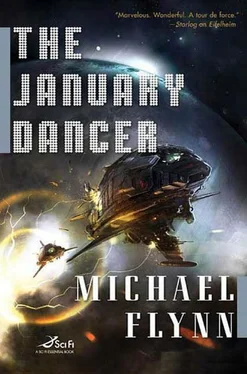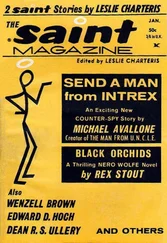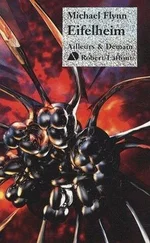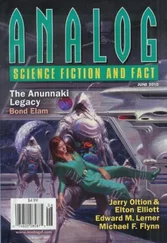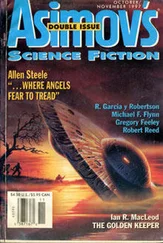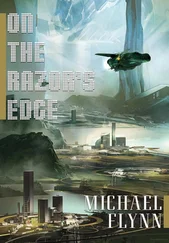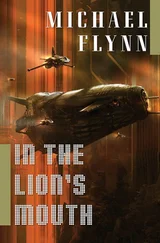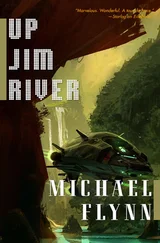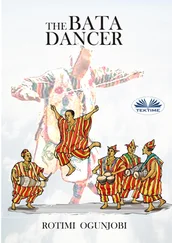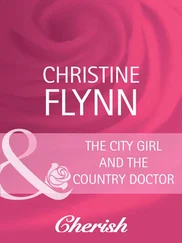Hugh put himself in the assassin’s mind. He must make sure of Todor and his companion, but he wouldn’t come out the building’s front entrance. Hugh had no gun, but the assassin wouldn’t know that. So, he’d go out the back to the alley behind. The airyways were blocked, so he’d have to go to one corner or the other. Not to Alkorry Street, which was farther and brightly lit, but to the left. And coming around that corner would give him a clear shot into the space behind the dustbin.
Now the only question was whether the sniper would expect astuteness of his quarry and so outguess the guesser. But one could reason oneself into paralysis in that manner, and paralysis, he knew, was the one fatal strategy.
There is this paradox of those who live on the edge, and that is that one may keep his life only by putting it at hazard. He must, as an ancient maxim had it, “desire life like water and yet drink death like wine.” Or, in the words of an older maxim, “He that would lose his life, the same shall save it.”
He was already running on cat feet across the empty street when he heard the shot whine off the paving. It had come from the direction of the main street. Hugh hunched over, dove for a shadowed airyway, and vanished into it. Stupid! he told himself. There had been two of them. The first to cover the Mild Beast; the second to block the way to the transit station. But he was sure there was no third man. Anyone positioned at the other end of the block would already have had a shot behind the dustbin. He listened, but heard no footsteps. The second man was either uncommonly silent or he was maintaining discipline.
The airyway was blocked like all the others. Hugh studied shadows, saw a deeper darkness in the ambit of the stairs, and melted from the airyway to crouch in its protection. From there he could slip through the garden-level passage under the stairs and up the other side. That put a stone staircase between him and the second sniper and he could move, with care, to the next building. Then, down again through the passage, and up, and that put him just at the corner.
There, he waited, either for his quarry to come or for the second shooter to move into a better position.
He listened.
The breeze was steady, channeled by the rows of buildings on either side of the street, but not strong enough to lift more than dust. A stone rattled from a careless kick. Hugh smiled grimly. The assassin likely thought he faced only a couple of drunks from the Beast, one of them—if he were in communication with the second man—last seen cowering in a blocked airyway two doors up the block.
He felt a presence approaching: stealthy, but not too much so. He readied himself, exhaled softly, emptied his mind, waited for the moment. A figure stepped around the corner with an air rifle already shouldered, a bead already hunting for the space where Todor lay with gun extended, and Hugh sprouted from the very pavement like a spartos from a dragon’s tooth, inhaling broadly as he did. He seized the gunman’s mouth in his left hand and ran the sica across his throat with the right, then pushed him forward to stumble and fall onto the street.
Hugh reached for the air rifle, but a bullet sang on the paving and he withdrew once more into the shadows. The second assassin was coming—he could hear the soft, rapid footsteps—and he had no intention of allowing Hugh to get to the fallen weapon. Of little use, now, his sica. He would get one throw, but the curved blade was not a good throwing knife and was unlikely to deal a death blow.
Then he heard the distinctive pop-pop-pop of a handgun followed by the clatter of a weapon sliding along the cobblestone paving. He risked a look and saw the other shooter sprawled in the center of the road and, in the stairwell to the Mild Beast, the Alabastrine woman checking the load in her weapon.
“Coom,” she called in a loud whisper, “my goon is noot so soondless as theirs. Roon.”
And so, they did.
Neither of them spoke until they had reached the transit station. The Alkorry Street platform was nearly deserted and here, well above street level, the breeze flowed unimpeded. Three young men dressed with feathers in their hair had congregated at the east end trying alternately to look tough and to keep the feathers from taking flight. Two hired-women stood by a kiosk near the center of the platform discussing in low tones their clients of the night and advertising for additional sales. Both groups eyed the newcomers—possible customers, possible prey—but one look was all they required to keep their distance.
Hugh regarded the ebony woman warily. He distrusted coincidence. What usually popped out of the machina was seldom a deus, and in his line of work surprises were seldom welcome.
Yet, the woman had saved his life.
“I didn’t have time to thank you, back there,” he said.
“That’s ookay,” she said, smiling like a skull. “I have my dooty, as do you. I have a message that you moost take to the one who calls himself Tool Benlever and to the Foodir. ‘Patience wears theen waiting for your dooty.’”
Hugh shook his head. “I don’t understand.”
“It is noot needful that you do. Joost tell them what I have said.”
“Who are you?”
“You may tell the soo-called Tool Benlever that my name is Ravn Olafsdottr, and that name is surety for what I have toold you. Now goo.” She pointed west with a toss of her head. There, a string of lights foretold the arrival of a train of capsules. When Hugh looked back, the Alabastrine was gone. He shivered. The Other Olafsson had appeared at last.
When the train pulled up he entered an empty capsule and keyed in the address of the hotel where “Benlever” and “Melisond” were staying. The system would shunt the capsule to the proper lines and bring it to the nearest station. The doors hissed closed and the train slid forward gathering speed. Through the window he saw the hired women welcoming two men who had stepped off another capsule. Then the train was sliding high over the rooftops with nothing but the night beyond them.
Evening has come to the plaza in the Corner and the stones of the fountain have grown chilled, for the blank-faced buildings have tossed their shadows across the square and pinched the sunlight into streams pouring from the narrow passageways. Down those arcades and alleys, plaster and stucco walls glow a golden red, as if they led to fabulous palaces just out of sight. The scarred man grunts and, leveraging himself on his knees, pushes to his feet and offers his arm. “Come,” he says. “The Corner is not a good place to be at night.” As if to underline his point, the harper hears the sounds of shutters closing, of locks tumbling, of bars sliding into place.
“I will buy you a dinner,” she says. “At the Hostel.”
But the old man shakes his head. “Such fare’s too rich for the likes of me. I’ll dine one day at the frozen center of Hel, and I’m saving up my appetite.”
She slings her harp case over her shoulder and takes his arm. “No,” she insists. “There is a meal I’ve always wanted to buy, and I’ll not be denied.”
The scarred man says nothing and the two walk slowly down Merry Weather Alley, toward Greaseline. After a moment, he pats her hand gently. “Thank you,” he says. “We’ve always wondered what came of it in the end. Whether it was all worth it.”
The harper fears to respond. Matters are too delicate; the most hesitant of touches could shatter them. Instead, she returns to the story. “Your Other Olafsson was too fortuitous. I thought her appearance bad art.”
“Oh, her appearance was bad enough without bringing art into it. There was nothing sudden to her. She’s been there all along, lurking in my prepositional phrases and subordinate clauses. It’s not that you haven’t been warned. She’d been to see the Committee of Seven; she followed Greystroke into and out of the Corner. She directed Micmac Anne to the Fudir’s table. She has loitered now and then in the background of my tale.”
Читать дальше
